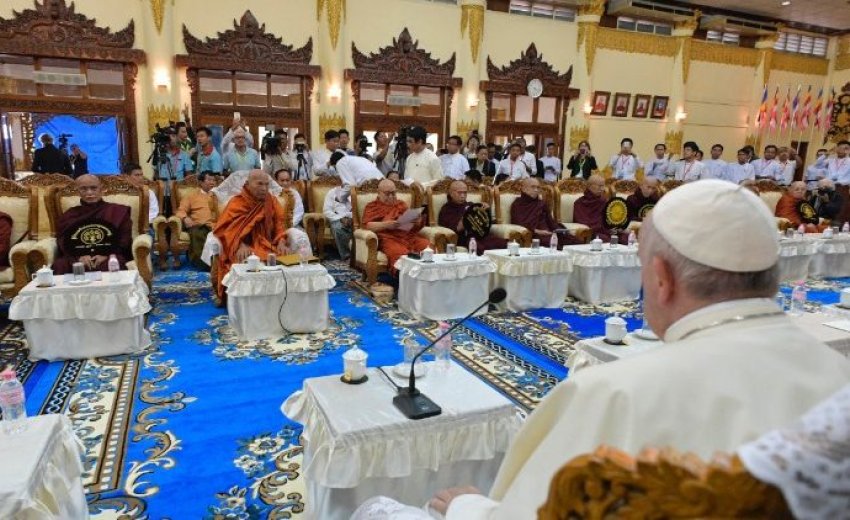The Pontifical Council for Interreligious Dialogue released a message on the occasion of the birthday of Guru Nanak, the founder of Sikhism, which will be marked on Nov. 23.
The Vatican is urging Christians and Sikhs to join hands to “promote a ‘culture of tenderness’ for the wellbeing of every human being and for the welfare of the entire created world!”
The Pontifical Council for Interreligious Dialogue (PCID) made the call in its message on the occasion of Sri Guru Nanak Prakash Diwas, or Guru Nanak Jayanti, the birthday of Guru Nanak, the first guru and founder of the Sikh religion. A national holiday in India, it will be celebrated on November 23 this year.
“Our cherished tradition of sharing with you some thoughts on this occasion draws your kind attention, this year, towards nurturing and promoting a culture of tenderness, since a culture of self-centredness and indifference towards one another seems to be taking root almost everywhere,” wrote the Pontifical Council in the message signed by its Secretary Bishop Miguel Ángel Ayuso Guixot.
The PCID said Christians and Sikhs can advance the culture of tenderness for the wellbeing of all human beings, especially the most vulnerable of the society such as the poor, the weak, the sick, the elderly, the disabled and the migrants, irrespective of religious affiliations.
This tenderness, the message said, can be fostered in children, students and others by families, religious teachings, educational institutions and the means of social communications.
Please find below the full text of the message:
Dear Sikh Friends,
The Pontifical Council for Interreligious Dialogue greets you all with warm felicitations and good wishes as you celebrate Sri Guru Nanak Prakash Diwas, this year, on 23 November. May your festivities marking this feast renew and reinvigorate the bonds of mutual respect and love in your families and communities, so also enhance – among you – happiness, harmony and peace!
Our cherished tradition of sharing with you some thoughts on this occasion draws your kind attention, this year, towards nurturing and promoting a culture of tenderness, since a culture ofself-centredness and indifference towards one another seems to be taking root almost everywhere. An alarming rise, moreover, in the number of people in our neighbourhoods and townships who feel unloved and uncared for is indicative of a tenderness index at an all-time low across the globe. Our reflection, therefore, also focuses on how we, both Christians and Sikhs, can advance the culture of tenderness for the wellbeing of all human beings.
‘Tenderness’, as experienced and explained commonly, is a gesture on one’s part that displays kindness and gentleness, care and concern towards the other. It is a display of the ability of the humans to feel with and feel for others. It is heartily looking at, listening to, being with and comforting others especially the most vulnerable of the society and doing everything possible, even taking risks, for their welfare. Pope Francis loves to describe it as “a movement that starts from our heart and reaches the eyes, the ears and the hand” (Video Talk, TED Conference, Vancouver, Canada, 25 April, 2017).
The foundation of ‘tenderness’ is, undoubtedly, God Himself who is ‘infinite tenderness’. However, we experience the divine tenderness, care and providence in times of need mostly through human instrumentality, as though it were God’s most preferred route. Thus, being needy ourselves of tenderness from God and others and being members of one human family we need today in our world what the Holy Father calls a “revolution of tenderness” (Pope Francis, Evangelii Gaudium, Apostolic Exhortation, 2013, no. 88) spearheaded through genuine gestures of care and concrete actions of compassion towards our brothers and sisters, specially the poor, the weak, the sick, the elderly, the disabled and the migrants, no matter which religious traditions they belong to. The greater ‘tenderness’ manifests itself in our words and deeds, the better can the culture of tenderness spread its roots far and wide. This tenderness must also extend to the whole of creation because caring for the earth and caring for one another go hand in hand; non-caring for the nature would amount to noncaring of human beings and vice versa ( Cf . Pope Francis, Message for the World Day of Prayer for the Care of Creation, 1 Sept. 2016, no. 1).
The formation in ‘tenderness’ evidently must begin in the families themselves where children, led by the example of parents and elders learn to show love, care and concern for others, particularly the weak and the needy, serving them and being of support to them. Religious teachings, educational institutions and means of social communications all definitely play a vital role in inculcating among practitioners of religions, students and the other citizens altruistic, benevolent and respectful behaviour towards others. If such a life pattern is adopted by adherents of every religion, there is bound to be greater harmony and peace in our world. Nurturing the ‘culture of tenderness’ can thus be the new model even for interreligious engagements and joint achievements, and for building a better world through a shared vision and a common action.
Both of our religions believe in the Fatherhood of God and Brotherhood of all human beings. Living by these religious convictions and encouraging others to live by the same, may we Christians and Sikhs, joining hands with believers of other religious traditions and all people of good will, do all we can, in humility and human solidarity to promote a ‘culture of tenderness’ for the wellbeing of every human being and for the welfare of the entire created world!
Wish you all, once again, a joyous and serene Prakash Diwas of Guru Nanak Dev Ji!

